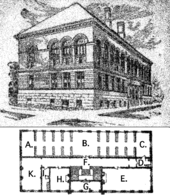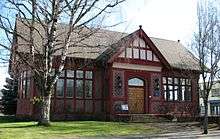Multnomah County Library
 | |
| Established | 1864 |
|---|---|
| Location | Multnomah County, Oregon |
| Coordinates | 45°31′8″N 122°40′59″W / 45.51889°N 122.68306°WCoordinates: 45°31′8″N 122°40′59″W / 45.51889°N 122.68306°W |
| Branches | 19 |
| Collection | |
| Size | 1,994,641 |
| Access and use | |
| Circulation | 22,715,292 |
| Population served | 724,680 |
| Members | 425,749 |
| Other information | |
| Budget | $61 million |
| Director | Vailey Oehlke |
| Staff | 495 FTE |
| Website | www.multcolib.org |
Multnomah County Library is the public library system serving Portland and Multnomah County, Oregon, United States. A continuation of the Library Association of Portland, established in 1864, the system now has 19 branches offering books, magazines, DVDs, and computers. It is the largest library system in Oregon, serving a population of 724,680, with more than 425,000 registered borrowers.[1] According to the Public Library Association, it ranks second among U.S. libraries, based on circulation of books and materials, and ranks first among libraries serving fewer than one million residents. In this respect, it is the busiest in the nation.[2]
History
After Leland H. Wakefield began collecting funds door-to-door in 1863, the Mercantile Library Association was started on January 12, 1864, with subscriptions by Portland's merchant elite.[3][4] Judge Matthew Deady was one of the early founders, with financial support coming from those such as Henry Corbett, William S. Ladd, and Erasmus D. Shattuck among others.[4] The more inclusive Library Association of Portland name was chosen, likely on Judge Deady's suggestion.[3][4] The founders proclaimed "the library should forever be kept free of politics."[3]
By March 1864, there were 153 members, who had subscribed $2,500, and Ladd was elected president.[3] Harvey W. Scott served as the first librarian, part-time, at its first location on Stark Street in Portland.[3][4] In 1869, the library moved to the Ladd & Tilton Bank Building where it received free rent.[4] Deady was the president from 1874 until 1893, and found that fundraising was "like pulling teeth", calling the local establishment "closefisted narrow visioned millionaires" in 1888, also stating "The rich men of Portland will never do much for [the library] until they die, and maybe not then."[3] The first major bequest came from Stephen Skidmore in 1883.[3]
In 1891, a new separate library, the Portland Public Library, was founded by a group that included some former LAP board members.[5] The two libraries merged in 1902.[5]

- Librarian
- Stack Room
- Ladies Room
- Toilet
- Newspapers
- Corridor
- Vestibule
- Chess Room
- Toilet
- Magazines
The library moved to a new two-story stone library building in 1893.[3][4] The building cost $156,477, representing 27 years of fundraising, mostly by Deady.[3][4] A large portion of the funds came from Ella M. Smith, daughter of Benjamin F. Smith, in 1889.[5] The library was staffed by D. F. W. Bursch, the library's first trained librarian, who oversaw the implementation of the Dewey Decimal system.[4] It contained 20,000 volumes.[3]
Prior to opening the library for free public access, the board tried to lower subscription costs as often as possible to allow a larger percentage of the general public to have access to the resource.[5] The board debated whether to accept government support, with Deady arguing against, out of concern for the encroachment of political influence, and on the principle that citizens would place more value on something they themselves paid for, even if the payment were small.[5] In 1897, board president George Henry Williams proposed that the librarian be empowered to remove materials deemed to demoralize people and disorganize society," an approach in keeping with common library practice at the time.[5]

The library declined an offer of a $100,000 donation from Andrew Carnegie in 1901, expressing "great pride" in Portland's ability to take care of itself; later, it did accept $105,000 in 1911 and $60,000 in 1912 to build branch locations.[5] The library received nearly 9,000 books in 1900 from the estate of John Wilson; many of these were rare books.[5] However, the bequest called for the books to be available free of charge to the public, thus the board voted to provide library services to the public under government contract.[5] In 1901, the state passed a law to allow governments to tax citizens to pay for libraries; the legislation had been advanced primarily by the newly organized State Federation of Women's Clubs.[5] The city of Portland and the library entered into a contract where the privately owned library continued to own its collection, but the city paid for services, thus creating a free publicly supported library.[5] In January 1901, the library allowed books to circulate for the first time.[5]
On March 16, 1902, Portland's library became the first free library in the state paid for by taxes.[5] At that time it features more than 38,000 volumes and 215 periodicals.[5] In 1913, the Library Association of Portland (LAP) built the Central Library in downtown Portland at Tenth Street.[5] They did not use any Carnegie funds for the project, instead financing came from a special two-year tax.[4][5]
On July 1, 1990, the LAP officially transferred ownership of the library buildings and collections to Multnomah County.[6][7]
Branches
The Multnomah County Library operates the Central Library in downtown Portland and 18 branches.
Central Library
.jpg)
The Central Library in downtown Portland serves as the main branch of the system. The building was designed by architect A. E. Doyle, and opened on September 6, 1913.[8] It was one of the first libraries in the United States to feature an open-plan.[9] The three-story Central Library was listed on the National Register of Historic Places as the Central Building, Public Library in 1979.[10] It contains 17 miles (27 km) of bookshelf space and has more than 130 computers for the public. The branch contains 125,000 square feet (11,600 m2) of space.[1]
Smaller branches
Midland is the largest of the branch locations with a total of 25,000 square feet (2,300 m2) followed by the Gresham location with 20,000 square feet (1,900 m2).[1] The St. Johns and North Portland branches are both Carnegie libraries. (There were also five Carnegie libraries no longer part of the system: Albina (old), Arleta, East Portland, the old Gresham Library, and South Portland).[11]
| Branch | Address | Neighborhood | First branch opened | Current branch opened |
|---|---|---|---|---|
| Albina Library | 3605 N.E. 15th Avenue | Irvington | 1906 | 1999 |
| Belmont Library | 1038 S.E. César E. Chávez Blvd | Sunnyside | 1924 | 1924 |
| Capitol Hill Library | 10723 S.W. Capitol Highway | W. Portland Park | 1972 | 1972 |
| Fairview-Columbia Library | 1520 N.E. Village Street | Fairview | 2001 | 2001 |
| Gregory Heights Library | 7921 N.E. Sandy Boulevard | Roseway | 1938 | 1966 |
| Gresham Library | 385 N.W. Miller Avenue | Gresham | 1903 | 1990 |
| Hillsdale Library | 1525 S.W. Sunset Boulevard | Hillsdale | 1913 | 2004 |
| Holgate Library | 7905 S.E. Holgate Blvd. | Foster-Powell | 1911 | 1971 |
| Hollywood Library | 4040 N.E. Tillamook Street | Hollywood | 1917 | 2002 |
| Kenton Library | 8226 N. Denver Avenue | Kenton | 1903 | 2010 |
| Midland Library | 805 S.E. 122nd Avenue | Hazelwood | 1958 | 1996 |
| North Portland Library | 512 N. Killingsworth Street | Humboldt | 1909 | 1913 |
| Northwest Library | 2300 NW Thurman Street | Northwest | 2001 | 2001 |
| Rockwood Library | 17917 S.E. Stark Street | Rockwood | 1963 | 1963 |
| Sellwood-Moreland Library | 7860 S.E. 13th Avenue | Sellwood | 1905 | 2002 |
| St. Johns Library | 7510 N. Charleston Avenue | St. Johns | 1913 | 1913 |
| Troutdale Library | 2451 S.W. Cherry Park Road | Troutdale | 2010 | 2010 |
| Woodstock Library | 6008 SE 49th Avenue | Woodstock | 1917 | 2000 |
Details
As of FY2010, the system has a total of 486 FTE employees, including 91 librarian FTE.[1] Total annual revenue was just over $62.8 million, with expenditures of $60.5 million.[1] There are more than 425,000 library card holders in the system that serves a population of over 700,000 people, the largest in the state. Multnomah County Library has a total of 1,994,541 books, DVDs, CDs, periodicals, and other library materials.[1] There was a total of 5,799,497 visits in FY2010 with the total circulation of 22,715,292.[1] The library system contains a total of about 700 computer search stations for the public and a combined total of 277,762 square feet (25,804.9 m2) of space at all 19 libraries.[1] The library is also a depository for the Federal Depository Library Program.[12]
See also
References
- 1 2 3 4 5 6 7 8 Oregon Public Library Statistics. Oregon State Library. Retrieved on February 9, 2011.
- ↑ Press release from Queens Library, August 2008. Retrieved on July 2, 2009. Original data from Public Library Data Service Statistical Report 2008. Chicago: PLA, 2008.
- 1 2 3 4 5 6 7 8 9 10 MacColl, E. Kimbark (1979). The Growth of a City: Power and Politics in Portland, Oregon 1915-1950. Portland, Oregon: The Georgian Press. p. 108. ISBN 0-9603408-1-5.
- 1 2 3 4 5 6 7 8 9 Corning, Howard M. (1989) Dictionary of Oregon History. Binfords & Mort Publishing. p. 147-8.
- 1 2 3 4 5 6 7 8 9 10 11 12 13 14 15 16 Gunselman, Cheryl. Pioneering Free Library Service for the City, 1864-1902: The Library Association of Portland and the Portland Public Library. Oregon Historical Quarterly, September 22, 2002. Pg. 320 Vol. 103 No. 3 ISSN 0030-4727
- ↑ About the library: History. Multnomah County Library. Retrieved on March 13, 2008.
- ↑ Cheryl Gunselman. "Library Association of Portland". The Oregon Encyclopedia.
- ↑ Central Library. Multnomah County Library. Retrieved on March 16, 2008.
- ↑ Gragg, Randy. Recycling the Armory. The Oregonian, September 24, 2006.
- ↑ "Oregon National Register List" (PDF). Oregon State Parks and Recreation Department. June 6, 2011. p. 31. Retrieved August 31, 2013.
- ↑ Carnegie Public Libraries in Oregon. OLA Quarterly, Volume 2, Number 1 — Spring 1996. Oregon Library Association. Retrieved on March 16, 2008.
- ↑ "Oregon". Federal Library Directory. U.S. Government Printing Office. Retrieved 16 August 2012.
Further reading
- Anderson, Katherine E. Historical Sketch of the Library Association of Portland, 1864-1964. Portland: The Library Association, 1964.
- Richard E. Ritz, Central Library: Portland's Crown Jewel. Portland: The Library Association, 2000. ISBN 0-9674860-0-9
External links
| Wikimedia Commons has media related to Multnomah County Library. |
| ||||||||||||||||